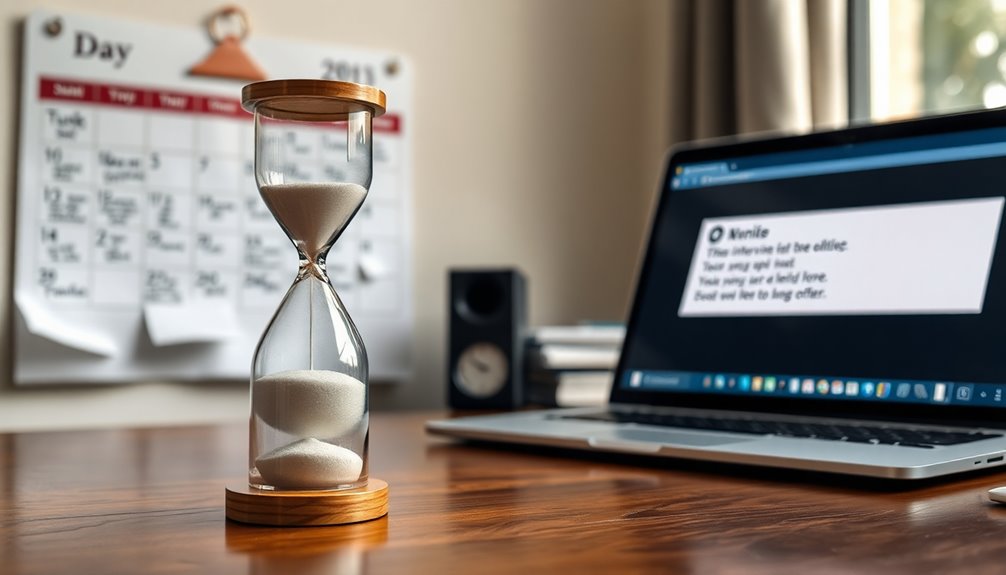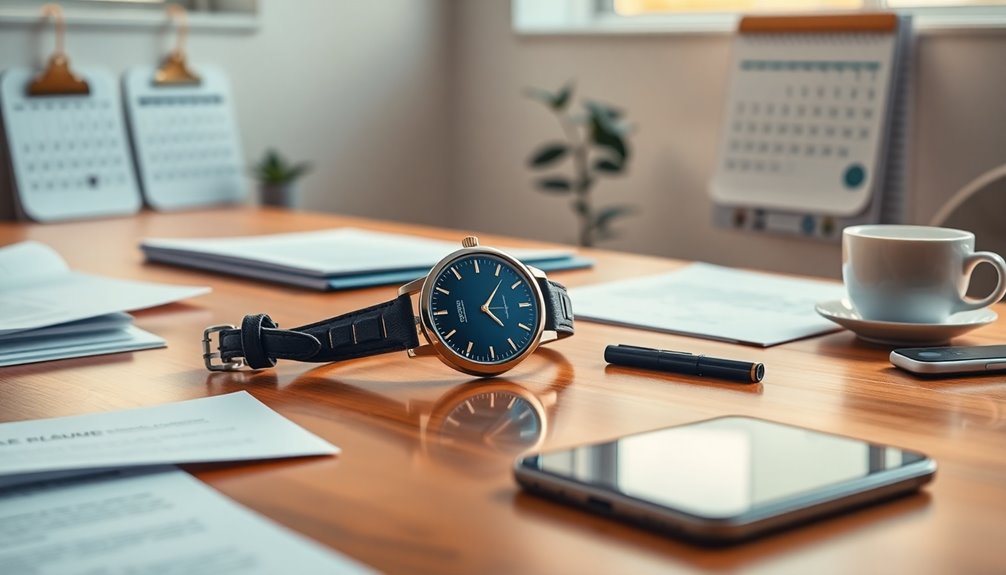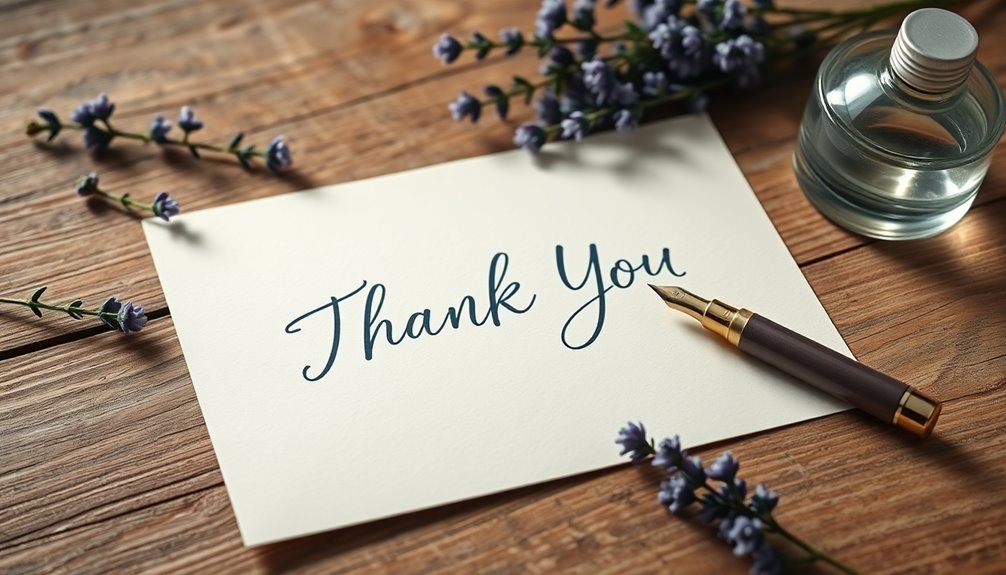You can typically expect a job offer between 2 to 4 weeks after your interview, but this timeframe can vary greatly. Larger companies like Google might take up to 8 weeks due to their intricate hiring processes. Meanwhile, some industries, such as restaurants, may extend offers in about 10 days. Factors like the number of candidates and internal decision-making can also lead to delays. To stay proactive, consider following up after 10 business days if you haven't heard back. Curious about what else affects these timelines? You'll find useful insights that can guide your expectations further.
Key Takeaways
- Typical job offer timelines range from 2 to 4 weeks post-interview, with an average wait of about 23.5 days.
- Larger companies like Google may take up to 8 weeks due to complex hiring processes.
- Government positions often have longer timelines, averaging around 53.8 days for offers.
- The restaurant industry typically sees offers within about 10.2 days, while academic roles average 60.3 days.
- Geographic factors influence timelines, with locations like Washington D.C. averaging 33.2 days compared to Kansas City's 16.9 days.
Average Timeframe for Job Offers

When it comes to job offers, timing can vary widely, but you can generally expect to hear back within 2 to 4 weeks after your interview. The average time for job seekers to receive an offer is around 23.5 days, according to a 2019 NACE survey. However, if you're interviewing with larger companies, like Google, the process can stretch up to 8 weeks due to their complex hiring processes.
During this waiting period, it's common to feel anxious while waiting to hear back from potential employers. The variability in response times often depends on the company's size, industry, and their internal decision-making processes. Some companies may take longer to finalize their decisions, which can lead to delays in job offers.
It's essential to stay proactive during this time. While you're waiting for an offer in hand, continue your job search and explore other opportunities. This approach not only alleviates stress but also keeps your options open, ensuring you're not solely dependent on a single role. Remember, the waiting period can be unpredictable, so maintaining momentum in your search is key to success.
Factors Influencing Offer Timelines

Several factors can influence how long you wait for a job offer after an interview. The typical time waiting to hear is between 2 to 4 weeks, but this varies greatly depending on the hiring process of the company. Larger organizations often have more complex hiring procedures, leading to longer approval processes. This can stretch the time it takes to receive a job offer considerably.
For instance, if you're applying for a government position, expect a much longer timeline—averaging around 53.8 days. In contrast, roles in the restaurant industry might only take about 10.2 days. The volume of candidates interviewed can also impact your wait, as hiring managers may need to reach a consensus among several decision-makers.
Additionally, high workloads or other responsibilities faced by hiring managers can delay feedback and overall decision-making. This means the interview process can quickly turn into a waiting game. Understanding these factors influencing offer timelines can help you manage your expectations and remain patient as you await that vital job offer.
Follow-Up Strategies During Wait

Following up after an interview is essential for demonstrating your continued interest in the position. Start by sending a thank-you note within 24 hours to express gratitude and reinforce your enthusiasm. This small gesture shows professionalism and keeps you top of mind.
During the waiting period, it's vital to manage your expectations. If the hiring manager didn't specify a timeframe, follow up after 10 business days. Here's a quick guide on follow-up strategies:
| Action | Timing | Purpose |
|---|---|---|
| Thank You Note | Within 24 hours | Express gratitude and interest |
| First Follow-Up Email | 10 business days | Inquire about hiring status |
| Second Follow-Up Email | 10-14 days later | Reiterate interest, check for updates |
While you might be keen to hear back, maintaining professionalism is key. Frequent communication can create an impression of desperation. Instead, focus on crafting well-timed, thoughtful messages that reflect your interest in the position while respecting the hiring manager's timeline.
Variability by Industry and Role

When it comes to job offers, timing can really vary based on the industry and the complexity of the role. For example, you might hear back in just over a week if you're applying for a restaurant position, but it could take months for academic roles. Understanding these differences can help you manage your expectations after an interview.
Industry-Specific Offer Timelines
Job seekers often find that the timeline for receiving a job offer after an interview can vary widely depending on the industry and specific role. According to NACE, the average time to get a job offer across various industries is about 23 days. However, this average conceals significant differences based on the sector. For instance, government positions often involve a lengthy hiring timeline, averaging around 53.8 days, while restaurant roles typically see offers in as little as 10.2 days.
In academia, the wait can stretch even longer, with professors facing an average of 60.3 days before they hear back. If you're applying for a restaurant position, you might receive an offer within a mere 8 days, showcasing the stark contrast in timelines. Additionally, geographic factors influence this variability; companies in Washington D.C. average 33.2 days for job offers, while Kansas City boasts a quicker timeframe of 16.9 days. Understanding these industry-specific offer timelines can help you set realistic expectations and reduce the anxiety of waiting to hear back after your interview.
Role Complexity Impact
The complexity of a role can considerably impact how long you wait for a job offer after an interview. For instance, if you're interviewing for a higher complexity position, like a professor, you might find yourself in a lengthy hiring process, averaging around 60.3 days. On the other hand, if you're aiming for a less complex role, such as a waiter, offers can come as quickly as 8 days post-interview.
Industries also play a significant role in shaping these timelines. The government sector, for example, has an average wait time of 53.8 days, while the restaurant industry is much faster, clocking in at just 10.2 days. Location matters too; in Washington D.C., you can expect an average of 33.2 days from interview to offer.
Job titles are essential in determining the speed of the hiring process. Senior roles tend to take longer due to additional layers of approval and decision-making. Overall, understanding the complexity of roles can help you set realistic expectations for the time it takes to receive a job offer after your interview.
Signs of a Positive Interview

During an interview, several signs can indicate a positive outcome and suggest you're being seriously considered for the role. First, look for positive body language from the interviewer. If they're smiling and maintaining eye contact, it shows they're engaged and interested in what you have to say.
If the interview lasts longer than scheduled, that could signal the interviewer's strong interest in your fit for the position. In-depth questions about your experiences and skills reflect genuine contemplation for your potential contribution to the team. These discussions often indicate they see you as a valuable candidate.
Another positive sign is if the interviewer talks about future steps in the hiring process. This can mean they're seriously weighing your application. Additionally, if you meet multiple team members during the interview, it often implies the company is keen on evaluating your cultural fit within the team.
These signs collectively suggest that you are not just another candidate but one they're actively considering. Recognizing these cues can help you gauge your chances of receiving a job offer.
Managing Expectations and Delays

Often, candidates find themselves in an anxious waiting game after an interview, wondering when they'll receive a job offer. On average, you can expect to hear back within 1-2 weeks, but it typically ranges from 2 to 4 weeks. If you're waiting longer than that, it's essential to keep in mind some common reasons for delays. Larger companies often have complex hiring structures, leading to longer wait times due to multiple approvals.
If you receive a verbal offer but don't get the official letter within a week, it could indicate potential issues within the hiring process. During this waiting period, continuous communication from recruiters generally signals ongoing interest. Conversely, a lack of updates might suggest internal challenges affecting the hiring decision.
The important thing is to manage your expectations effectively; don't put all your hopes on one opportunity. It's wise to continue looking for other positions while you wait. This proactive approach can reduce anxiety and keep your options open, ensuring you're prepared, no matter how long it takes to hear back.
Frequently Asked Questions
How Long After an Interview Is a Job Offer Made?
After your interview, you can expect a job offer within 2 to 4 weeks. However, it might take longer, especially with larger companies that have complex hiring processes. Sometimes, delays happen due to multiple candidates being interviewed or hiring managers juggling other responsibilities. While you're waiting, it's smart to keep your job search active. Don't put all your hopes on one opportunity; you never know how long it'll take to hear back.
What Is the Average Wait Time for a Job Offer After Interview?
The average wait time for a job offer after your interview typically ranges from 2 to 4 weeks. You might expect feedback within 1 to 2 weeks, but it's important to remember that larger companies or more complex hiring processes can stretch this to 8 weeks. While waiting, it's smart to keep searching for other opportunities. This approach helps reduce uncertainty and keeps your options open during the waiting period.
How Long Do Companies Reach Out After Interview?
After your interview, companies typically reach out within 1 to 2 weeks. If you didn't get a specific timeframe during the interview, expect feedback within 10 business days. Keep in mind that larger organizations may take longer, sometimes up to 8 weeks, due to their complex hiring processes. Factors like high applicant volumes and internal decision-making can also delay communication, so try to be patient while waiting for their response.
How Long After the Final Interview Do You Get Decisions?
After your final interview, you can typically expect a decision within 2 to 4 weeks. If you're a recent graduate, the average wait time's about 23.5 days. However, larger companies might take longer due to their complex hiring processes. Factors like candidate volume and internal decision-making can impact how quickly you hear back. If communication from recruiters continues, it usually indicates ongoing interest in your application.
Conclusion
As you wait for that coveted job offer, imagine standing at the edge of a serene lake, the ripples of time flowing gently around you. Remember, it's normal to feel anxious, but staying patient is key. Keep your eyes peeled for signs of a positive outcome, and don't hesitate to follow up if needed. Just as the sun rises each day, your opportunity is on the horizon—trust the process, and soon you could be stepping into your new role!









